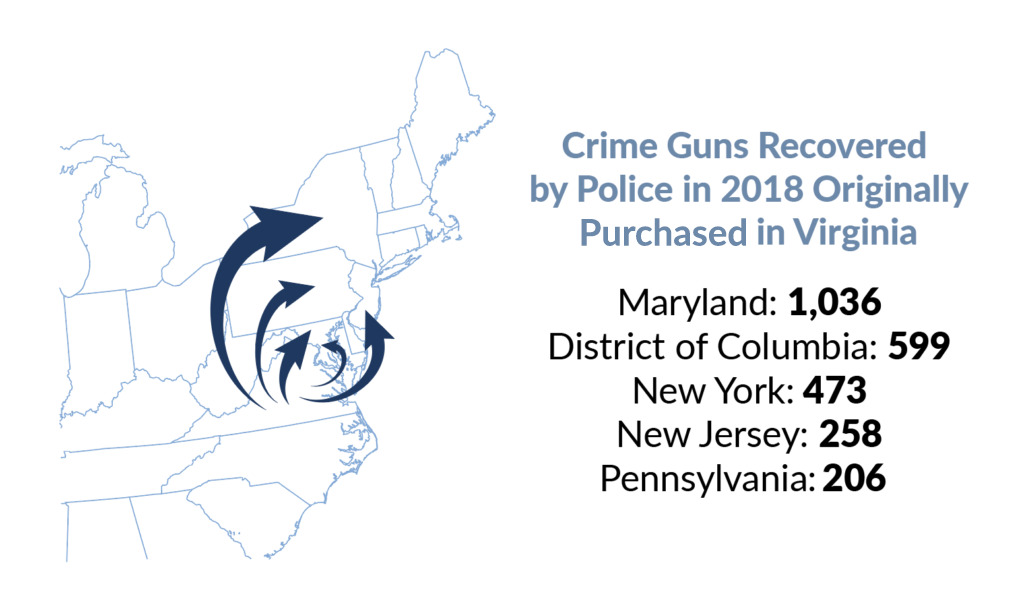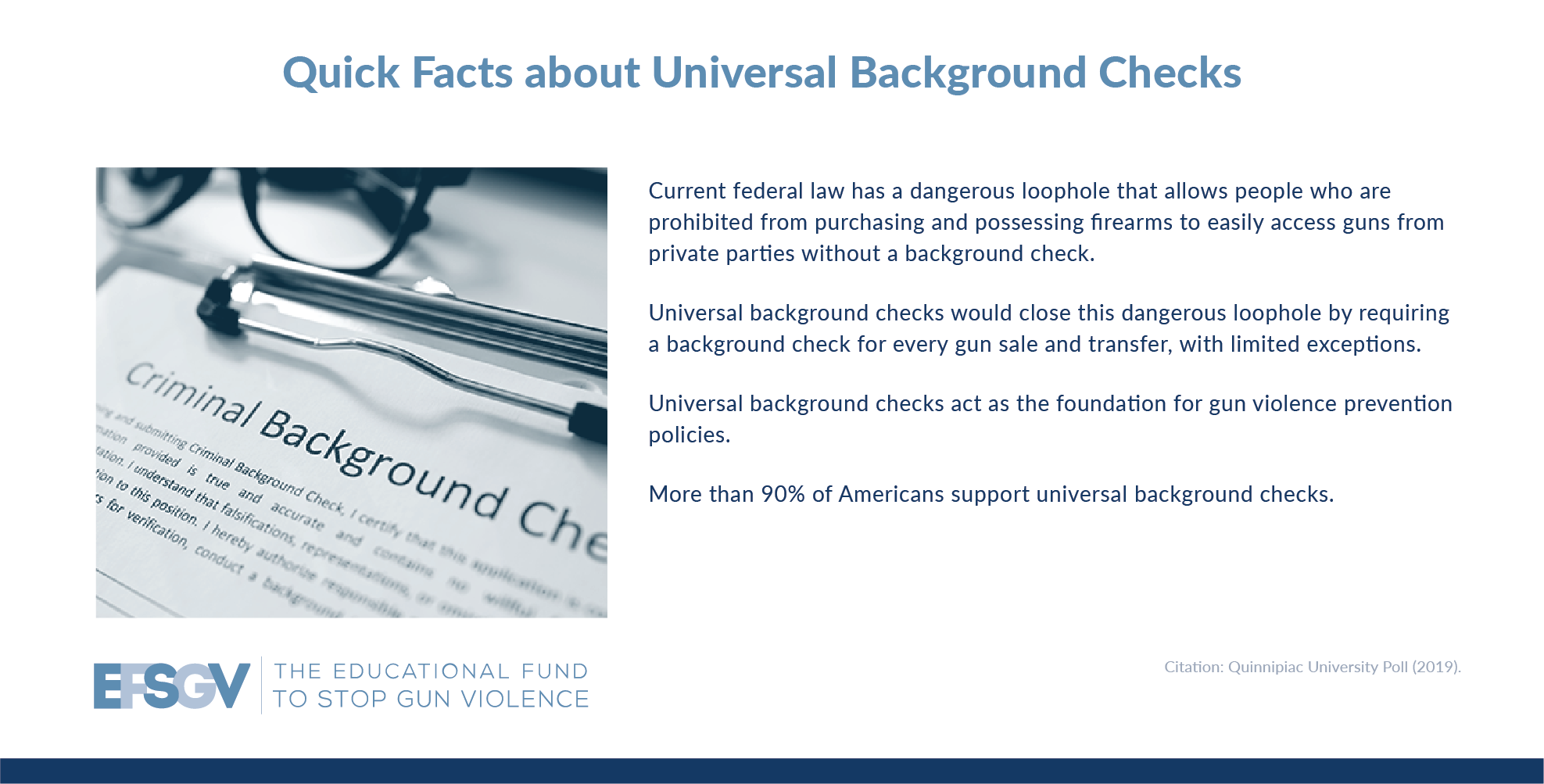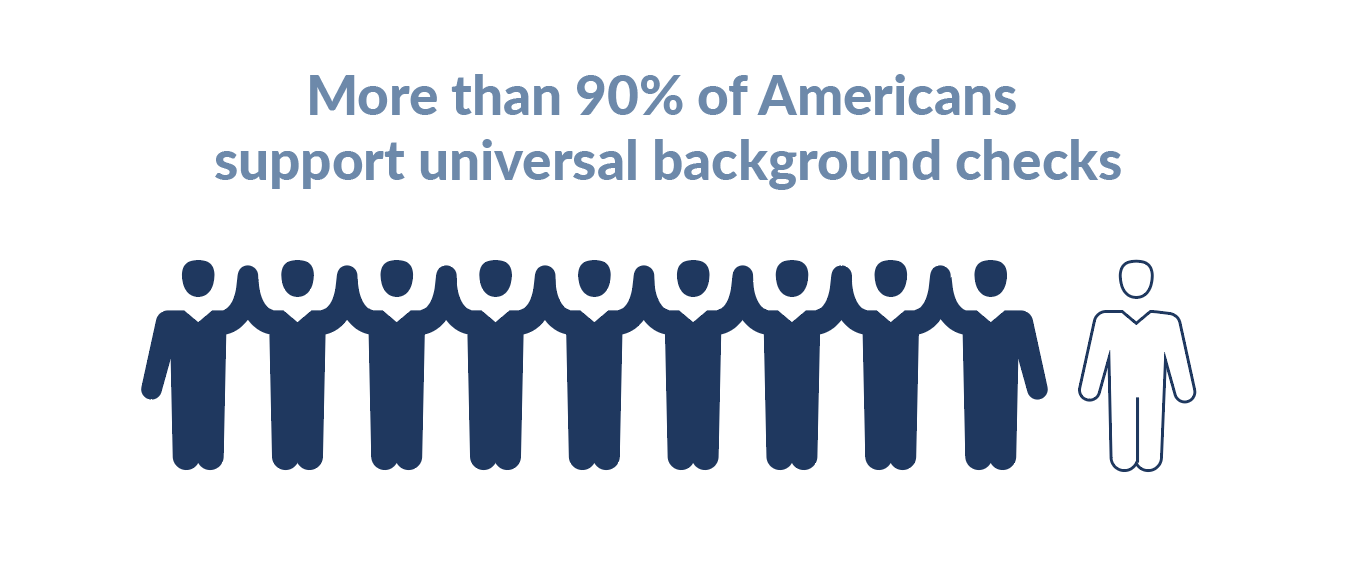Universal Background Checks
- BACKGROUND
- A DANGEROUS LOOPHOLE IN THE BACKGROUND CHECK SYSTEM: PRIVATE SALES AND TRANSFERS
- PUBLIC SUPPORT FOR UNIVERSAL BACKGROUND CHECKS
- MANY STATES HAVE AIMED TO CLOSE THE PRIVATE SALE LOOPHOLE
- UNIVERSAL BACKGROUND CHECKS ARE NECESSARY BUT NOT SUFFICIENT TO REDUCE GUN VIOLENCE
- LIFE SAVING EXEMPTION: ALLOWING TEMPORARY GUN TRANSFERS TO PREVENT SUICIDE
- DEFAULT PROCEEDS: THE BACKGROUND CHECK SYSTEM’S “CHARLESTON LOOPHOLE”
- RECOMMENDATIONS
- RESOURCES
BACKGROUND
Background checks are a critical tool used by law enforcement to stop prohibited purchasers from purchasing and possessing firearms. They are the foundation for many gun violence prevention policies. The 1993 Brady Act requires that anyone wishing to purchase a gun from a federally licensed firearms dealer, such as at a gun store, undergo a background check. The dealer must run the purchaser’s basic information through the FBI’s National Instant Criminal Background Check System (NICS) to determine any prohibitions before the firearm purchase. This background check process is not burdensome; in fact, nine out of ten background checks are completed within minutes.1
The Brady Act has been instrumental in keeping guns out of the hands of people who may pose a threat to themselves or others. Since the passage of this act, over 3 million applications have been denied because the applicant was legally prohibited from owning a gun.2
A DANGEROUS LOOPHOLE IN THE BACKGROUND CHECK SYSTEM: PRIVATE SALES AND TRANSFERS
There is a dangerous loophole in the current background check system. The law only applies to guns purchased through federally licensed firearms dealers “engaged in the business” of selling firearms. This law excludes individuals who “make[] occasional sales, exchanges, or purchases of firearms for the enhancement of a personal collection or for a hobby, or who sell[] all or part of his personal collection of firearms.”3
Persons prohibited from purchasing or possessing firearms can thus avoid federally licensed firearms dealers, and instead choose to buy firearms through unlicensed sellers or dealers (aka “private sales”). These private sales often take place at gun shows (aka “gun show loophole”) or by buyers and sellers being connected through online gun marketplaces. Many states have taken steps to close this loophole, but federal law does not require these private sellers or transferors to conduct simple background checks, making the Brady Act easy to thwart.
In August 2015, a 48-year-old Texas man who spent 12 years in prison for five felony convictions and had a long history of domestic abuse convictions purchased a handgun from a private dealer online, which did not require a background check. He then proceeded to shoot and kill his ex-girlfriend and six of her children, including his own son.4, 5 This loophole in the background check system allowed him to easily purchase a handgun despite being prohibited.
This private sale loophole creates an avenue for prohibited purchasers — including people convicted of felonies and crimes of domestic violence – to easily buy guns. Millions of people acquire guns without background checks every year, and they are more likely to do so in states that do not regulate private gun sales. A 2015 survey found that nearly 1 in 4 gun owners (22%) who acquired guns within the last two years did so without a background check.6 People prohibited from purchasing or possessing guns often use this loophole to commit violence. For example, one study found that 96% of persons convicted of a violent crime who were legally prohibited from owning a gun purchased their gun from a supplier not required to conduct a background check.7

Source: Miller M, Hepburn L, & Azrael D. (2017). Firearm acquisition without background checks: results of a national survey. Annals of Internal Medicine.
The growth of online gun markets, which sometimes overtly advertise that they don’t require background checks, has exacerbated the private sale loophole. It allows prohibited purchasers and private sellers to purchase and sell guns anonymously over the internet within minutes, no questions asked.8 Not only does this private market allow for sales to prohibited purchasers, it allows for guns to be purchased in bulk from private sellers with zero record keeping requirements in states with weak laws and brought to states with stronger gun laws. The weaknesses within the current background check system allow a secondary, illegal firearms market to thrive in cities all over the country.
Virginia: A case example of passing universal background checks as the foundation for preventing gun trafficking
Guns purchased in states with weak gun laws are often trafficked to states with stronger background check requirements. Virginia has long been an example, but in 2020, lawmakers took the first steps to successfully close this dangerous loophole.
For years, gun traffickers have exploited Virginia’s weak gun purchasing laws by purchasing guns in bulk and trafficking those guns to states in the Northeast with stronger gun purchasing laws. This gun trafficking route, from southern states with weak gun laws like Virginia to northern states along Interstate 95, is known as the Iron Pipeline. Fortunately, in 2020, Virginia lawmakers closed the background check loophole by instating a universal background check system, helping to stem the flow of guns trafficked along the Iron Pipeline. While passing state universal background checks alone will not address the entire problem of inter-state gun trafficking, research has found that it reduces inter-state trafficking by 29%.9
“I began lobbying in Virginia for gun violence prevention policies, like universal background checks, after my daughter was shot and injured and 32 others were murdered in their classrooms at Virginia Tech — 13 years ago. Over the past decade, the politics around gun violence prevention have changed. The Coalition to Stop Gun Violence is proud to have driven this change and are thrilled to see the most substantial gun violence prevention bills in Virginia’s history become law. Virginia’s new universal background check law will stem the flow of gun trafficking along the Iron Pipeline, prevent gun violence in impacted communities, and save countless lives.”
— Lori Haas, Senior Director of Advocacy and Virginia State Director

Source: ATF. (2018). Firearm Types Recovered and Traced in the United States and Territories.
PUBLIC SUPPORT FOR UNIVERSAL BACKGROUND CHECKS
A number of national opinion polls demonstrate that the vast majority of Americans from all walks of life support universal background checks. For example, a 2019 Quinnipiac University poll found that 94% of American voters support universal background checks including 90% of gun owners.10
MANY STATES HAVE AIMED TO CLOSE THE PRIVATE SALE LOOPHOLE
Twelve states and the District of Columbia have closed the private sale loophole entirely. These states have enacted universal background check laws requiring that every individual wishing to purchase or transfer a gun to undergo a background check at the point of sale with certain very limited exceptions.11
An additional ten states have taken steps to close the private sale loophole in federal law but have not closed it entirely.12 The extent to which they close the private sale loophole varies by state. Some state background check laws only apply to certain classes of firearms (like handguns), allowing for the private transfer of other gun classes (long guns) without a background check.13 Other states, which have gun licensing laws, do not require that a background check be conducted at the point of transfer or sale of a firearm but instead beforehand when an individual applies for a license to purchase and/or possess a firearm. Some states allow for the firearms to be gifted or loaned for long periods of time without requiring a background check.14
Many states have taken vital action to close the private sale loophole in federal law. These efforts are essential in continuing to push for a common-sense gun policy that keeps guns out of the hands of individuals who pose a danger to themselves or others and are prohibited from purchasing or possessing firearms.
UNIVERSAL BACKGROUND CHECKS ARE NECESSARY BUT NOT SUFFICIENT TO REDUCE GUN VIOLENCE
Background checks provide the foundation for many other gun violence prevention policies by ensuring prohibited purchasers are stopped from buying guns at the point of sale. Research finds that universal background checks at the state level reduce illegal intrastate gun trafficking, which often fuels gun violence in cities.15 State universal background check laws also are linked to a 29% decrease in crime guns trafficked across state lines.16 While these findings are promising, the impacts of state universal background check laws, by themselves, are limited. Recent studies have found that these laws alone are not linked to significant reductions in gun violence.17 The impact of state universal background check laws is likely weakened by the fact that prohibited purchasers in states with strong gun laws can simply travel to a state without universal background checks to buy guns from a private seller, or even buy online. Poor implementation and inconsistent enforcement have also likely diminished the effectiveness of these laws.18 Research suggests high rates of noncompliance within states with universal background check laws. For example, a 2016 survey found that in states with universal background check laws, one out of every four private firearm transfers were still completed without a background check.19
A federal universal background check law would avoid many of the pitfalls that have hindered the impact of state laws. If supported with adequate funding for implementation and enforcement, federal universal background check laws would likely have a stronger impact on preventing the diversion of firearms into the illegal market and in reducing firearm violence.
Ultimately, many solutions are required to stop gun violence and universal background checks are the foundation. Evidence-based policies like extreme risk laws, domestic violence prohibitions, licensing, and age-related purchase prohibitions are all reliant on an effective background check system.
“Stopping gun violence requires a myriad of solutions. There is not one bill or law that will magically save every life. But in order for policies to be successful, we must have universal background checks. Background checks are the foundation upon which other policies must build.”
- Josh Horwitz, Executive Director
LIFE SAVING EXEMPTION: ALLOWING TEMPORARY GUN TRANSFERS TO PREVENT SUICIDE
Research consistently notes that temporarily removing firearms from individuals during or in anticipation of a suicidal crisis makes it less likely an individual will die during a suicide attempt, as other means are less lethal.20 If an individual is experiencing suicidality and has access to a firearm, it is recommended to temporarily store the firearm away from the home, or at least to store the firearm locked and unloaded and in a way so that the individual at high risk does not have access until the risk has subsided.21 However, universal background check laws in some states can affect the ability to easily transfer a firearm in such high-risk situations. To address this, some states have included a specific exemption in state background check laws that clearly allows for temporary transfers of firearms to prevent imminent death or self-harm.22 A clear exemption for temporary transfers can help mitigate any confusion around the legality of temporary firearm transfers and can help prevent firearm suicide.23
“Background checks are the foundation of all policies designed to keep guns away from high-risk individuals. New and existing gun prohibitions cannot be fully enforced without a background check on all gun sales.”
- EFSGV organized a letter to U.S. Congress signed by thirty of the nation’s leading gun violence researchers
DEFAULT PROCEEDS: THE BACKGROUND CHECK SYSTEM’S “CHARLESTON LOOPHOLE”
The current background check system on federally licensed firearm dealers is widely effective in flagging individuals who are prohibited from owning a gun. However, there is a loophole that allows some individuals prohibited from owning a gun to slip through the cracks. The vast majority of federal gun background checks are completed within minutes. However, in some cases, the FBI faces barriers that increase the time it takes to complete a background check.24 When FBI documentation is potentially incomplete or unclear, FBI investigators must track down state and local records to complete the background check.25 Current federal law states that if a federally licensed firearms dealer does not hear from the FBI within three business days, the dealer can proceed with the sale even though a background check on the buyer has not been completed. This is called a “default proceed” sale and is often referred to as the “Charleston loophole.”26
Similar to universal background checks, the vast majority of Americans also support addressing the Charleston Loophole. While public polling on closing the Charleston Loophole is limited, a 2013 poll found that 76% of Americans, including 67% of gun owners, support allowing law enforcement five business days to complete a background check.27 Likewise, 80% of respondents from a 2019 poll of South Carolina residents supported closing the loophole entirely by requiring that a background check be completed before any gun purchase occurs, even if the background check takes more than three days to complete.28
In 2015, the default proceed loophole allowed a White supremacist to buy a gun that he then used to kill nine people at a historically Black church in Charleston, South Carolina. The perpetrator was prohibited from owning a gun but the FBI was unable to collect the proper legal information from local prosecutors to complete the background check within the three day time frame. Despite an incomplete background check and an ongoing FBI investigation into the perpetrator’s criminal history, the gun dealer was legally permitted to sell him the gun.29
An analysis of FBI data found that each year this loophole allows hundreds of thousands of people to buy guns from licensed dealers without first obtaining a background check. In 2018 alone, the FBI failed to complete 276,000 gun background checks within the three day period, meaning that gun dealers could choose to sell guns to these individuals even though they had not completed a background check.30
While the majority of these buyers end up eventually passing a background check, thousands of guns are sold each year to prohibited purchasers. In 2018, the FBI reported at least 3,960 cases where prohibited purchasers bought guns from a licensed dealer because of this loophole. At least 785 of these individuals were convicted of a domestic violence misdemeanor and 77 had domestic violence restraining orders filed against them.31 In recent years an increasing number of large-scale firearm dealers, like Walmart, have instituted company policy prohibiting the sale of firearms without a completed background check. In part due to public pressure, these firearm dealers have voluntarily taken steps to close the Charleston loophole.32
RECOMMENDATIONS
Enact and implement a true universal background check law that requires background checks on all gun sales and transfers, including private and online sales, and eliminate “default proceed” sales.
Enact a true universal background check law:
The Brady Handgun Violence Prevention Act of 1994 requires federally-licensed firearm dealers to conduct background checks on every sale. However, there is a major loophole — the law does not require background checks for sales or transfers between private parties, including at gun shows and on the internet. Requiring a background check on every gun sale and transfer, including private and online sales, with certain exemptions, is critical to preventing gun violence. Universal background checks are the foundation upon which all other gun violence prevention policies are built. Congress should close the loophole in federal law and require a background check on every gun sale and transfer in the United States, including private and online sales. The universal background check law should include a specific exemption for temporary transfers to prevent imminent death or self-harm. In the absence of federal action, states should continue to pass their own universal background check laws.
Eliminate default proceed:
The majority of federal gun background checks are done instantly. However, if the FBI cannot immediately tell if a potential gun buyer is prohibited, the FBI has three business days to complete the background check. If the firearm dealer does not hear from the FBI within those days, the dealer can sell the gun to the buyer. This is called a “default proceed” sale. Congress should close this loophole by eliminating default proceed sales and require that a gun background check must be completed before a firearm sale can proceed. In the absence of federal action, states should continue to eliminate default proceed sales. In the absence of federal and state action, individual sellers should commit to not completing a firearm sale without receiving a completed background check stating that a sale may proceed.
RESOURCES
Educational Materials
Fact sheets
- Closing Illegal Gun Markets: Virginia’s Gun Show Loophole
- CSGV-Universal Background Checks: Including Temporary Transfers to Prevent Suicide
Reports
Read More
- July 2019 blog, Virginia policymakers must act to stop gun violence
- June 2019 EFSGV press release, Researchers Call on Senate to Pass Universal Background Checks
- June 2019 EFSGV Federal Universal Background Checks Endorsement Letter by leading academic researchers
- February 2019 CSGV press release, HR 8: Historic Universal Background Checks Bill Passes the House
- February 2019 op-ed in The Hill, It's Finally Time to Pass Universal Background Checks
Research
- Crifasi CK, Meyers, JS, Vernick JS, & Webster DW. (2015). Effects of changes in permit-to-purchase handgun laws in Connecticut and Missouri on suicide rates. Preventive Medicine.
- McCourt AD, Vernick JS, Betz ME, Brandspigel SB, & Runyan CW. (2017). Temporary transfer of firearms from the home to prevent suicide, legal obstacles and recommendations. Journal of American Medicine Association Internal Medicine.
- Miller M, Hepburn L, & Azrael D. (2017). Firearm acquisition without background checks: results of a national survey. Annals of Internal Medicine.
- Rudolph KE, Stuart EA, Vernick JS, & Webster DW. (2015). Association between Connecticut’s permit-to-purchase handgun law and homicides. American Journal of Public Health.
- Vernick, JS, Alcorn T, & Horwitz J. (2017). Background checks for all gun buyers and gun violence restraining orders: state efforts to keep guns from high-risk persons. The Journal of Law, Medicine & Ethics,
- Vittes KA, Vernick JS, & Webster DW. (2013). Legal status and source of offenders’ firearms in states with the least stringent criteria for gun ownership. Injury Prevention.
- Webster DW, Vernick JS, & Bulzacchell MT. (2009). Effects of state-level firearm seller accountability policies on firearm trafficking. Journal of Urban Health.
- Webster DW, Vernick JS, McGinty EE, & Alcorn T. (2013). “Preventing the Diversion of Guns to Criminals Through Effective Firearm Sales Laws,” in Reducing Gun Violence in America: Informing Policy with Evidence and Analysis. The Johns Hopkins University Press.
- Wintemute GJ. (2013). “Comprehensive background checks for firearm sales: evidence from gun shows.” in Reducing Gun Violence in America: Informing Policy with Evidence and Analysis. The Johns Hopkins University Press.
Last updated July 2020


